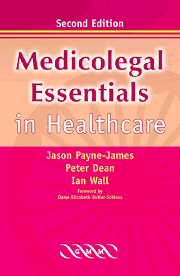Book contents
- Frontmatter
- Contents
- Contributors
- Editors' note for the first edition
- Editors' note for the second edition
- Foreword
- Table of statutes
- Table of cases
- 1 Legal institutions and the legal process
- 2 Human rights and healthcare professionals
- 3 Medical ethics and the forensic physician
- 4 Confidentiality
- 5 Consent to medical treatment
- 6 Professional bodies and discipline
- 7 Complaints in the National Health Service
- 8 The Mental Health Act (England and Wales)
- 9 Death certification and the role of the coroner
- 10 Tissues and organs
- 11 Organ donation
- 12 Living wills
- 13 Euthanasia and end-of-life decision-making
- 14 Abortion and reproductive health
- 15 The Children Act 1989
- 16 Clinical negligence
- 17 Legislation for medicines and product liability
- 18 Clinical trials: ethical, legal and practical considerations
- 19 Medicolegal implications of blood-borne viruses
- 20 Healthcare professionals in court – professional and expert witnesses
- Index
20 - Healthcare professionals in court – professional and expert witnesses
Published online by Cambridge University Press: 12 January 2010
- Frontmatter
- Contents
- Contributors
- Editors' note for the first edition
- Editors' note for the second edition
- Foreword
- Table of statutes
- Table of cases
- 1 Legal institutions and the legal process
- 2 Human rights and healthcare professionals
- 3 Medical ethics and the forensic physician
- 4 Confidentiality
- 5 Consent to medical treatment
- 6 Professional bodies and discipline
- 7 Complaints in the National Health Service
- 8 The Mental Health Act (England and Wales)
- 9 Death certification and the role of the coroner
- 10 Tissues and organs
- 11 Organ donation
- 12 Living wills
- 13 Euthanasia and end-of-life decision-making
- 14 Abortion and reproductive health
- 15 The Children Act 1989
- 16 Clinical negligence
- 17 Legislation for medicines and product liability
- 18 Clinical trials: ethical, legal and practical considerations
- 19 Medicolegal implications of blood-borne viruses
- 20 Healthcare professionals in court – professional and expert witnesses
- Index
Summary
INTRODUCTION
This chapter addresses issues relevant for preparing and giving evidence. Though the title mentions court the main principles involved apply wherever that person gives evidence. The range is quite large and includes, criminal courts, civil courts, death investigation (Coroners Courts in England and Wales and Fatal Accident Inquiries in Scotland for example), family courts, child protection conferences, employment and discipline tribunals.
The term ‘court’ will be used but the same principles apply whatever the form of the tribunal. The healthcare professional may be involved in court in two ways, as a professional witness to fact or as an expert witness where the role may be to express opinions on the role of others. There are two stages to any evidence giving process, the first is the preparation of a written document, the second is the attendance at the court to give live testimony.
A report is a written way of transferring information between professionals within the same discipline or across discipline boundaries. It also allows the information involved to be accessed at a later date and on numerous occasions without the author being present.
A statement in this context is viewed as a specialised format of a report. In medico-legal matters the content should be same whether the specialised format is used or not.
- Type
- Chapter
- Information
- Medicolegal Essentials in Healthcare , pp. 233 - 240Publisher: Cambridge University PressPrint publication year: 2004
- 1
- Cited by

